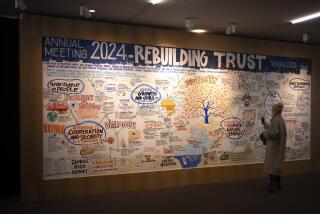The Need for Transparency Is Clear
- Share via
Tony Blair today will welcome Bill Clinton, Boris Yeltsin and the other leaders of the so-called Group of 8 (the seven leading industrial nations and Russia) to Birmingham, England, where they will wrestle with key global issues like making the world economy work, protecting the environment and fighting the drug trade. The summit is a unique chance to come up with a global response to global problems.
The financial crisis in Asia is just that sort of global problem. It has shown how much our jobs and prosperity are connected with events on the other side of the planet. In a global economy where countries are as interdependent as they used to be independent, we cannot afford to leave the Asians to their troubles. If we want to protect our economies, our jobs and our prosperity, we in the West will have to play our part in returning Asia to full economic health.
Britain and its European partners have been at the forefront of the efforts to assist. At the Asia-Europe summit last month, we set up a trust fund to allow Asian governments to draw on European expertise in managing financial markets. We have been active in ensuring a quick and effective response from the International Monetary Fund and the World Bank. And we have good reason to get involved: Europe has tremendous investment throughout Asia, and millions of European jobs rely on Asian trade. The exposure of European banks to Asia is greater than that of U.S. and Japanese banks put together.
There are three key lessons to draw from the crisis. The first is to make sure that we have the right institutions and means to handle this sort of crisis. Last weekend, the G8 finance and foreign ministers met with the heads of the World Bank, the IMF and the World Trade Organization to talk through the implications of the past year. Those institutions already are making enormous efforts to improve their capacities to respond to this sort of market turmoil and also to prevent it from happening in the first place.
The second lesson is that transparency and free trade are more necessary than ever. There is a temptation at times of crisis to take refuge in easy solutions like protectionism and rigging the markets. But protectionism damages everyone, whereas genuinely free and fair trade creates prosperity and jobs. Rigging the markets--through corruption or denying them transparency--can only bring short-term relief. The markets always know, and they impose a heavy penalty. The discipline of the markets is not always welcome, but it is a powerful ally of truth, efficiency and transparency.
The third lesson is that real transparency goes well beyond the markets. The financial crisis in Asia has had an impact well beyond the flickering screens of the stock exchanges and currency dealers. It has had a major effect on the streets and in society. And society has a major long-term impact on the financial markets. Transparency should not just refer to banking regulations and fiscal policy. It needs to go well beyond this to the free flow of ideas, to honest and democratic governments with effective oppositions and to the strength and flexibility that go with open societies.
Businessmen want to know that their investments are protected by the rule of law and will not have to be supported by quiet payments to the right people. Markets need to know that the government has the strength and inclination to make their decisions based on sound economic criteria. And innovation will take root only where ideas are given room to breathe. A work force cannot be expected to have inquiring and critical minds in the factory and yet not apply their minds to their government. A government cannot encourage citizens to embrace the Information Age and then deny them an informed debate on public policy.
Real development has as much to do with building an open society as with orthodox market economics. Liberty and open government are not a brake on growth but the basic conditions for genuine and sustainable development. Politics and economics, human rights and fiscal discipline, democracy and competitiveness are no longer worlds apart but essential ingredients to success in the modern world.
More to Read
Inside the business of entertainment
The Wide Shot brings you news, analysis and insights on everything from streaming wars to production — and what it all means for the future.
You may occasionally receive promotional content from the Los Angeles Times.










